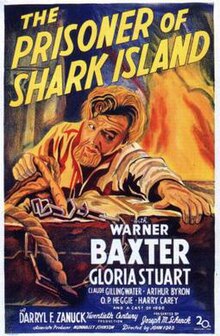fiction.wikisort.org - Movie
The Prisoner of Shark Island is a 1936 American drama film loosely based on the life of Maryland physician Samuel Mudd, who treated the injured presidential assassin John Wilkes Booth and later spent time in prison after his controversial conviction for being one of Booth's accomplices. The film was produced by Darryl F. Zanuck, was directed by John Ford and starred Warner Baxter and Gloria Stuart.
This article needs additional citations for verification. (September 2014) |
| The Prisoner of Shark Island | |
|---|---|
 film poster by Joseph A. Maturo | |
| Directed by | John Ford |
| Written by | Nunnally Johnson |
| Produced by | Nunnally Johnson Darryl F. Zanuck |
| Starring | Warner Baxter Gloria Stuart Frank McGlynn Francis McDonald |
| Cinematography | Bert Glennon |
| Edited by | Jack Murray |
| Music by | R.H. Bassett Hugo Friedhofer |
Production company | Twentieth Century Fox |
| Distributed by | Twentieth Century Fox |
Release date |
|
Running time | 96 minutes |
| Country | United States |
| Language | English |
Twentieth Century Pictures, before it merged with Fox, purchased the rights to the book The Life of Dr. Mudd by Nettie Mudd Monroe, the doctor's daughter. The film's credits, however, make no reference to Monroe or her book. Modern sources state that Darryl F. Zanuck, Twentieth Century's vice-president in charge of production, got the idea to make the film after he read an article in Time magazine about the prison camp for political prisoners on the Dry Tortugas island.[1]
Plot
A few short hours after the assassination of President Abraham Lincoln (Frank McGlynn Sr.), Dr. Samuel Mudd (Warner Baxter) gives treatment to a man with a broken leg who shows up at his door. Mudd does not know that the president has been assassinated and the man who he is treating is John Wilkes Booth (Francis McDonald). Mudd is arrested for being an accessory in the assassination and is sent to prison on the Dry Tortugas, described as in the West Indies and referred to in the film as "America's own Devil's Island".
After a period of ill treatment due to his notoriety, and an unsuccessful escape attempt, his skills as a doctor are requested by the Commandant of the prison. The island has been in the grip of a yellow fever epidemic and the official prison doctor has fallen ill. Dr. Mudd takes charge with the blessing of the Commandant and the cooperation of the soldier guards, and the yellow fever epidemic subsides.
In the end he receives a pardon and is allowed to return home.
Cast

- Warner Baxter as Dr. Samuel Alexander Mudd
- Gloria Stuart as Mrs. Peggy Mudd
- Claude Gillingwater as Col. Jeremiah Milford Dyer
- Arthur Byron as Mr. Erickson
- O.P. Heggie as Dr. MacIntyre
- Harry Carey as Commandant of Fort Jefferson
- Francis Ford as Cpl. O'Toole
- John McGuire as Lt. Lovett
- Francis McDonald as John Wilkes Booth
- Douglas Wood as Gen. Ewing
- John Carradine as Sgt. Rankin
- Joyce Kay as Martha Mudd
- Fred Kohler Jr. as Sgt. Cooper
- Ernest Whitman as 'Buck' Milford
- Paul Fix as David Herold
- Frank Shannon as Joseph Holt
- Frank McGlynn Sr. as President Abraham Lincoln
- Leila McIntyre as Mary Todd Lincoln
- Etta McDaniel as Aunt Rosabelle Milford
- J.M. Kerrigan as Judge Maiben
- Arthur Loft as Frank J. Thomas - Carpetbagger
- Paul McVey as Gen. David Hunter
- Maurice Murphy as Prison Hospital Orderly
- Jack Pennick as Corporal (uncredited)
- Robert Homans as Sergeant (uncredited)
- Murdock MacQuarrie as Edman Spangler (uncredited)
- Cyril Thorton as Michael O'Laughlen (uncredited)
- Cecil Weston as Mary Surratt (uncredited)
- Lloyd Whitlock as Henry Rathbone (uncredited)
References
Further reading
- Hughes, James (November 7, 2012). "REVIEW: The Prisoner of Shark Island". Oxford American.
Shark Island still manages, seventy-five years later, to be adventurous, bizarre, redemptive, and blistering in its assessment of American power. A must for the Lincoln catalog.
A reconsideration of the film in the context of the 2012 film Lincoln.
External links
- The Prisoner of Shark Island at the American Film Institute Catalog
- The Prisoner of Shark Island at IMDb
- The Prisoner of Shark Island at AllMovie
- Dr. Mudd Research Site
- The Prisoner of Shark Island at Virtual History
- 1938 Lux Radio Theater broadcast of The Prisoner of Shark Island
На других языках
- [en] The Prisoner of Shark Island
[ru] Узник острова акул
«Узник острова акул» (англ. The Prisoner of Shark Island) — кинофильм режиссёра Джона Форда, вышедший на экраны в 1936 году. Фильм основан на биографии доктора Сэмюэла А. Мадда[en].Другой контент может иметь иную лицензию. Перед использованием материалов сайта WikiSort.org внимательно изучите правила лицензирования конкретных элементов наполнения сайта.
WikiSort.org - проект по пересортировке и дополнению контента Википедии